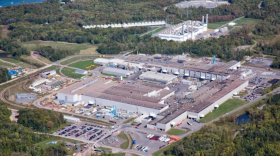Something is wrong in Orleans, a small town in the Thousand Islands. Tap water there is contaminated with high levels of salt. The water is not only unfit to drink, it eats bathroom fixtures and destroys washing machines. The problem has gone on for at least a decade. Homeowners suspect road salt from a nearby salt barn is to blame, and they want help from the state.
Phil Reed lives on Route 12 between the Thousand Islands Bridge and Fisher’s Landing in Orleans. His house is warm and comfortable. But ask for glass of water, and things get complicated. Reed’s water doesn’t come from his faucet. It comes from his pantry.

Reed pointed to a couple of five-gallon jugs. He said his tap water is really salty. And can make you sick. He definitely doesn't cook with the water.Reed took me on a mini-disaster tour to show me the problems his water has caused. There’s corrosion on the kitchen faucet. His water glasses are chipped and foggy. Reed’s water has destroyed four dishwashers, two washing machines and lots of shower heads.
“I challenge anyone to come here and tell me this isn’t a salt problem,” Reed said.
Reed is a Jefferson County legislator whose district covers Orleans. In 2013, a consultant tested 50 wells in Orleans.The wells all have hard water, some with high levels of lead. Most of the wells tested high for sodium chloride.
To give you an idea of how much salt is in Reed’s water, consider this. Two hundred fifty milligrams of chloride per liter is enough to make water taste salty. Reed’s water has four times that much.
“There is anecdotal evidence that there are 50 properties around this facility that have a problem. It’s a disgrace,” he said.

The New York State Department of Transportation stores road salt in a barn a half-mile from Reed's home. It’s right off Interstate 81. Reed said he thinks salt left uncovered was leeching into groundwater for years. The DOT doesn’t acknowledge the connection between its salt and the salt in the Orleans water supply. But it has delivered fresh water to the Thousand Island Winery across the road since 2003. No one at the regional DOT office would comment on this story.
Assemblywoman Addie Russell said the best solution is for Orleans to get clean water from Alexandria Bay. It’ll cost the town $13 million to connect to an existing pipeline and bring water to several neighborhoods along Route 12.
“I don’t think the DOT will say anything that will make them seem liable for anything," she said.
Orleans now has a designated water district and has qualified for an $11 million to finance the project. Russell hopes a stage agency, the Environmental Facilities Corporation, will give the rest. Orleans could be considered in the next round of funding this summer.
“It’s been complex and challenging but I think we are extremely close," Russell said.
Orleans town supervisor, Kevin Rarick said the state should foot the bill for the pipeline.
“It’s just frustrating," he said. According to Rarick you can see what the salt has done just by driving down Route 12.

“You turn right and look at the blight. I got a motel that’s defunct, small businesses that are defunct because they don’t get good water,” Rarick said.
Dan Kelting, a professor at Paul Smith's College in the Adirondacks, said road salt is arguably the biggest threat to lakes and groundwater in the region.
“Half of it washes off and goes into the streams and lakes and goes away. The other half percolates into the soil and into the groundwater," he said.
Over years, homeowners might notice their water is starting to taste salty.
“By the time that happens that large aquifer the homeowner is drawing from is significantly contaminated with salt,” Kelting said.
And there’s no going back, according to Kelting. Once groundwater is contaminated, only hundreds of years of snowmelt and rain can flush it out.
“Don’t contaminate your groundwater. That’s like a lesson,” Kelting said.
Orleans Water District Boundary Map







